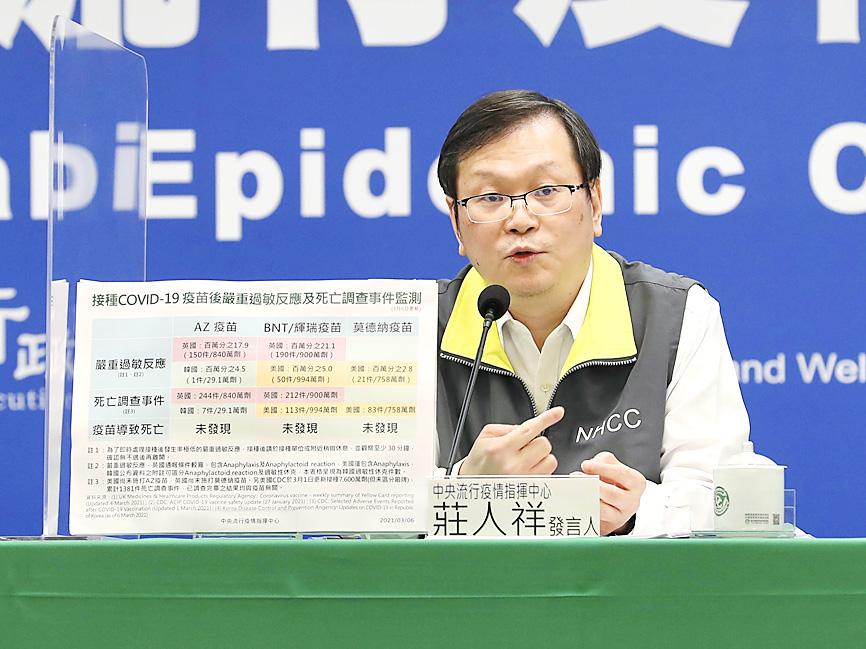Many countries are still administering the AstraZeneca COVID-19 vaccine, although a few have suspended vaccinations after reports of blood clots, and healthcare workers in Taiwan can choose freely if they want to get the jab, the Central Epidemic Command Center (CECC) said yesterday.
Centers for Disease Control (CDC) Deputy Director-General Chuang Jen-hsiang (莊人祥), who is the CECC’s spokesman, said that a few European countries have stopped administering AstraZeneca shots after reports of blood clots, adding that the European Medicines Agency (EMA) is investigating the cases.
“So far, the EMA’s recommendation is that the vaccine’s benefits continue to outweigh its risks, and there is currently no indication that the thromboembolic events were caused by vaccination,” he said.

Photo: CNA
Nonetheless, the CECC would continue to pay close attention to developments in the EMA’s assessment, he added.
Many countries continue to administer the AstraZeneca vaccine, including Australia, Canada, France, Germany, Mexico, South Korea and the UK, he said, adding that the WHO has suggested that the shot should continue to be administered.
Asked if healthcare workers in Taiwan can opt out of getting the jab due to blood clot fears following a willingness survey conducted at hospitals, Chuang said: “The survey is for the center’s reference only, and whether they want to get vaccinated is still up to them. We will not force them to get the shot.”
The ratio of reported severe allergic reaction cases following COVID-19 vaccination in the UK is about 17.9 per 1 million AstraZeneca vaccine shots and about 21.2 per 1 million Pfizer-BioNTech vaccine shots, so they could be considered “rare events” for both vaccines, Chuang said.
Separately yesterday, the CECC reported one new imported case of COVID-19 in Taiwan.
Chuang said the case is a South African woman in her 20s who came to Taiwan for work on Feb. 19.
She tested negative for COVID-19 on Feb. 20 and again before completing centralized quarantine on March 4, he said.
She moved to another residence on March 6 to practice self-health management and took a paid test for COVID-19 at a hospital on Friday, which came back positive, he added.
The cycle threshold values from the test and another test on Saturday were 34 and 37 respectively, indicating low viral loads, Chuang said.
The woman on Saturday tested negative for IgM antibodies and positive for IgG antibodies, indicating a past infection, he said.

The US government has signed defense cooperation agreements with Japan and the Philippines to boost the deterrence capabilities of countries in the first island chain, a report by the National Security Bureau (NSB) showed. The main countries on the first island chain include the two nations and Taiwan. The bureau is to present the report at a meeting of the legislature’s Foreign Affairs and National Defense Committee tomorrow. The US military has deployed Typhon missile systems to Japan’s Yamaguchi Prefecture and Zambales province in the Philippines during their joint military exercises. It has also installed NMESIS anti-ship systems in Japan’s Okinawa

‘WIN-WIN’: The Philippines, and central and eastern European countries are important potential drone cooperation partners, Minister of Foreign Affairs Lin Chia-lung said Minister of Foreign Affairs Lin Chia-lung (林佳龍) in an interview published yesterday confirmed that there are joint ventures between Taiwan and Poland in the drone industry. Lin made the remark in an exclusive interview with the Chinese-language Liberty Times (the Taipei Times’ sister paper). The government-backed Taiwan Excellence Drone International Business Opportunities Alliance and the Polish Chamber of Unmanned Systems on Wednesday last week signed a memorandum of understanding in Poland to develop a “non-China” supply chain for drones and work together on key technologies. Asked if Taiwan prioritized Poland among central and eastern European countries in drone collaboration, Lin

ON ALERT: Taiwan’s partners would issue warnings if China attempted to use Interpol to target Taiwanese, and the global body has mechanisms to prevent it, an official said China has stationed two to four people specializing in Taiwan affairs at its embassies in several democratic countries to monitor and harass Taiwanese, actions that the host nations would not tolerate, National Security Bureau (NSB) Director-General Tsai Ming-yen (蔡明彥) said yesterday. Tsai made the comments at a meeting of the legislature’s Foreign Affairs and National Defense Committee, which asked him and Minister of National Defense Wellington Koo (顧立雄) to report on potential conflicts in the Taiwan Strait and military preparedness. Democratic Progressive Party (DPP) Legislator Michelle Lin (林楚茵) expressed concern that Beijing has posted personnel from China’s Taiwan Affairs Office to its

BACK TO WORK? Prosecutors said they are considering filing an appeal, while the Hsinchu City Government said it has applied for Ann Kao’s reinstatement as mayor The High Court yesterday found suspended Hsinchu mayor Ann Kao (高虹安) not guilty of embezzling assistant fees, reducing her sentence to six months in prison commutable to a fine from seven years and four months. The verdict acquitted Kao of the corruption charge, but found her guilty of causing a public official to commit document forgery. The High Prosecutors’ Office said it is reviewing the ruling and considering whether to file an appeal. The Taipei District Court in July last year sentenced Kao to seven years and four months in prison, along with a four-year deprivation of civil rights, for contravening the Anti-Corruption